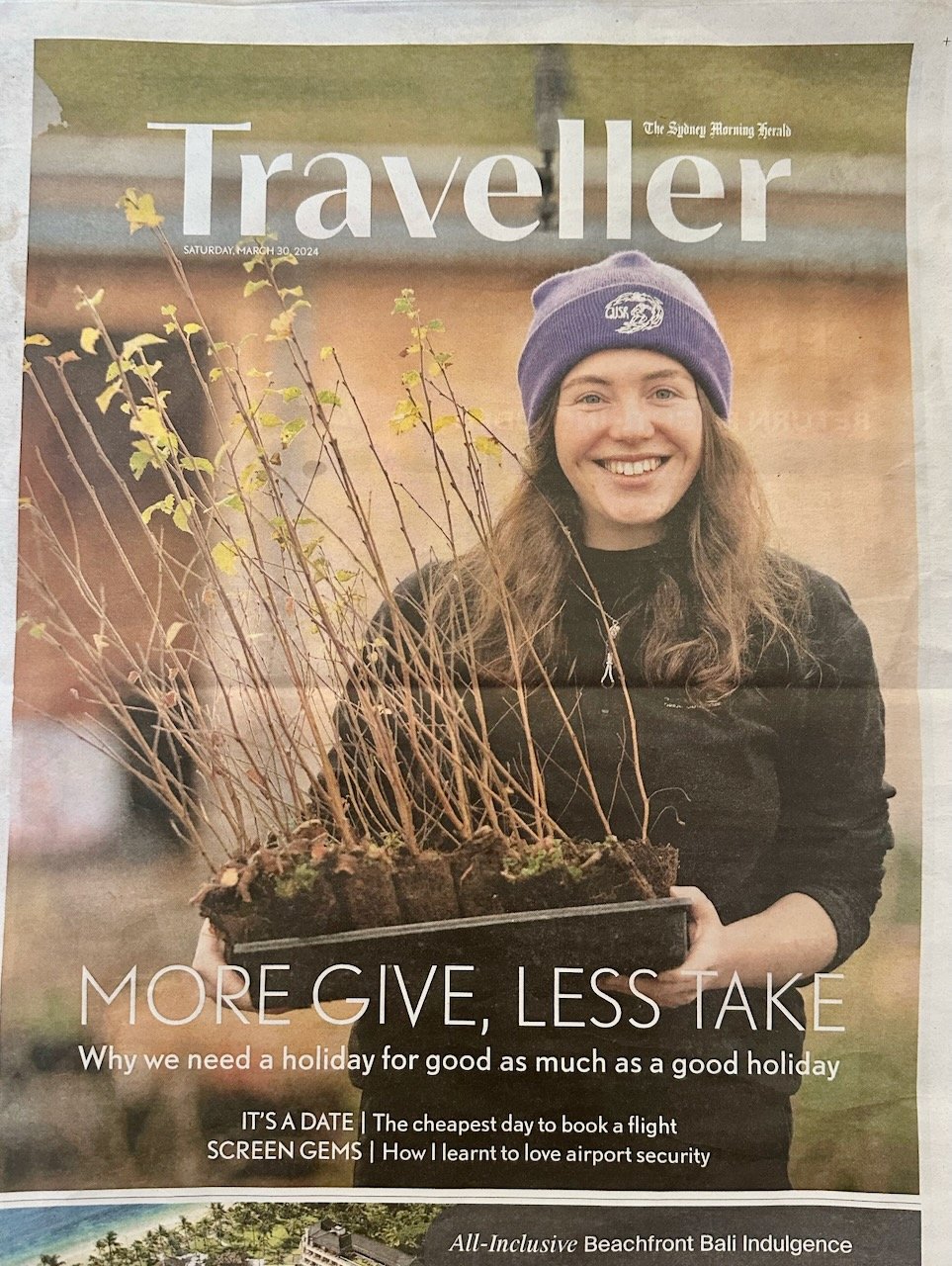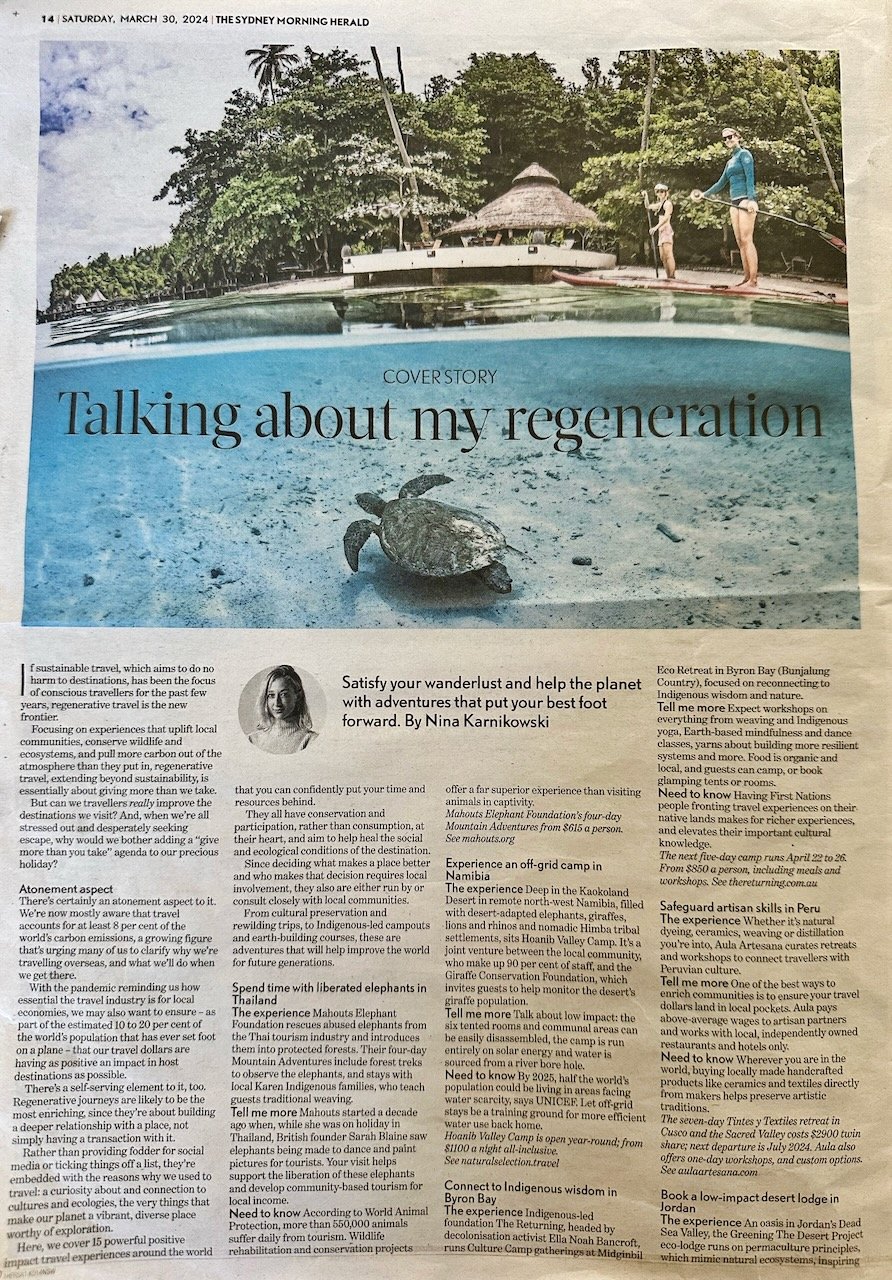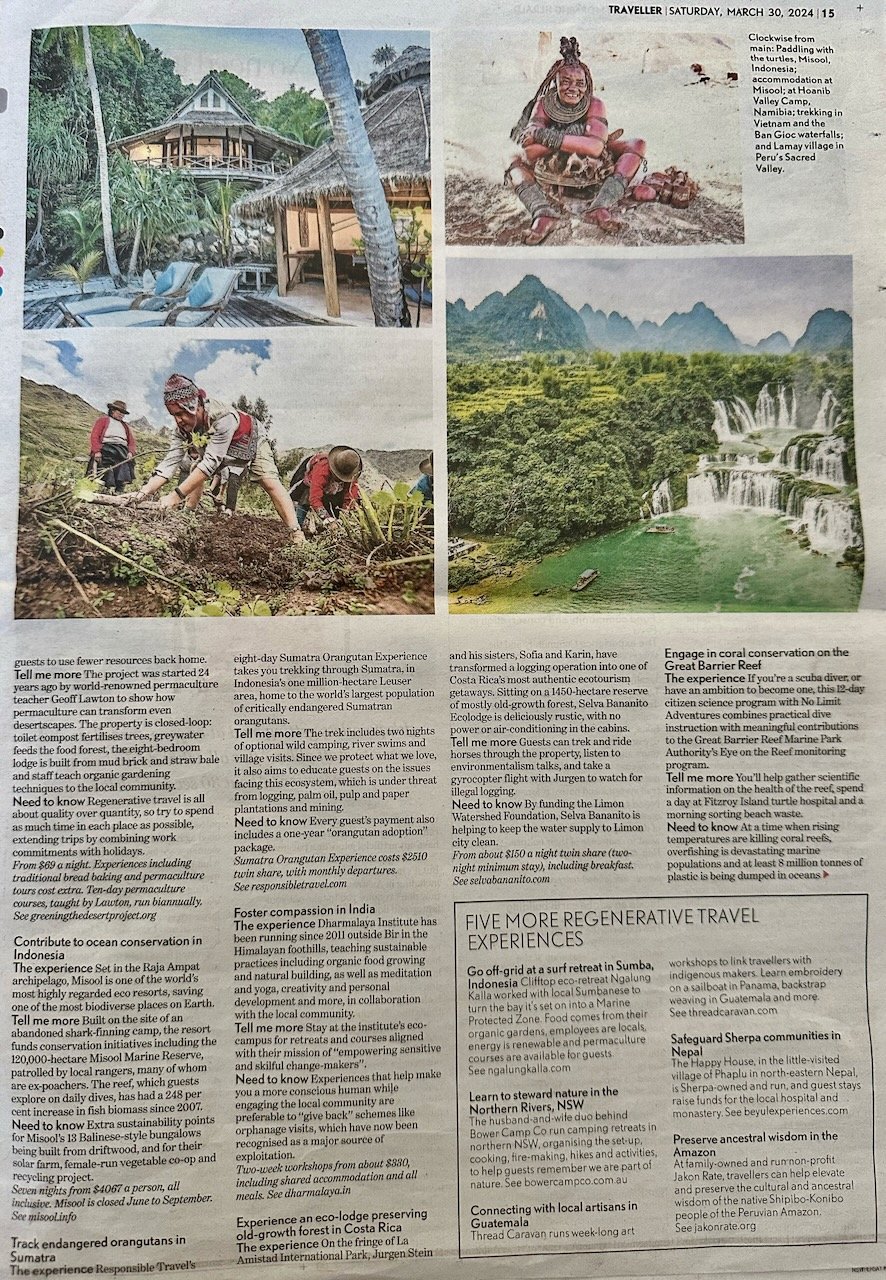REGENERATIVE TRAVEL FUTURE: SMH TRAVELLER
SATISFY YOUR WANDERLUST AND HELP THE PLANET WITH ADVENTURES THAT PUT YOUR BEST FOOT FORWARD. BY NINA KARNIKOWSKI.If sustainable travel, which aims to do no harm to destinations, has been the focus of conscious travellers for the past few years, regenerative travel is the new frontier.
Focusing on experiences that uplift local communities, conserve wildlife and ecosystems, and pull more carbon out of the atmosphere than they put in, regenerative travel, extending beyond sustainability, is essentially about giving more than we take.
But can we travellers really better the destinations we visit? And, when we’re all stressed out and desperately seeking escape, why would we bother adding a “give more than you take” agenda to our precious holiday?
There’s certainly an atonement aspect to it. We’re now mostly aware that travel accounts for at least 8 per cent of the world’s carbon emissions, a growing figure that’s urging many of us to clarify why we’re travelling overseas, and what we’ll do when we get there.
With the pandemic reminding us how essential the travel industry is for local economies, we may also want to ensure – as part of the estimated 10 to 20 per cent of the world’s population that has ever set foot on a plane – that our travel dollars are having as positive an impact in host destinations as possible.
There’s a self-serving element to it, too. Regenerative journeys are likely to be the most enriching, since they’re about building a deeper relationship with a place, not simply having a transaction with it.
Rather than providing fodder for social media or ticking things off a list, they’re embedded with the reasons why we used to travel: a curiosity about and connection to cultures and ecologies, the very things that make our planet a vibrant, diverse place worthy of exploration.
Here, we cover 20 powerful positive impact travel experiences around the world that you can confidently put your time and resources behind.
They all have conservation and participation, rather than consumption, at their heart, and aim to help heal the social and ecological conditions of the destination.
Since deciding what makes a place better and who makes that decision requires local involvement, they also are either run by or consult closely with local communities.
From cultural preservation and rewilding trips, to Indigenous-led campouts and earth-building courses, these are adventures that will help improve the world for future generations.
Spend time with liberated elephants in Thailand
The experience Mahouts Elephant Foundation rescues abused elephants from the Thai tourism industry and introduces them into protected forests. Their four-day Mountain Adventures include forest treks to observe the elephants, and stays with local Karen Indigenous families, who teach guests traditional weaving.
Tell me more Mahouts started a decade ago when, on holiday in Thailand, British founder Sarah Blaine saw elephants being made to dance and paint pictures for tourists. Your visit helps support the liberation of these elephants and develop community-based tourism for local income.
Need to know According to World Animal Protection, more than 550,000 animals suffer daily from tourism. Wildlife rehabilitation and conservation projects offer a far superior experience than visiting animals in captivity.
Mahouts Elephant Foundation’s four-day Mountain Adventures from $615 a person. See mahouts.org
Connect to Indigenous wisdom in Byron Bay
The experience Indigenous-led foundation The Returning, headed by decolonisation activist Ella Noah Bancroft, runs Culture Camp gatherings at Midginbil Eco Retreat in Byron Bay (Bunjalung Country), focused on reconnecting to Indigenous wisdom and nature.
Tell me more Expect workshops on everything from weaving and Indigenous yoga, Earth-based mindfulness and dance classes, yarns about building more resilient systems and more. Food is organic and local, and guests can camp, or book glamping tents or rooms.
Need to know Having First Nations people fronting travel experiences on their native lands makes for richer experiences, and elevates their important cultural knowledge.
The next five-day camp runs April 22 to 26. From $850 a person, including meals and workshops. See thereturning.com.au
Safeguard artisan skills in Peru
The experience Whether it’s natural dyeing, ceramics, weaving or distillation you’re into, Aula Artesana curates retreats and workshops to connect travellers with Peruvian culture.
Tell me more One of the best ways to enrich communities is to ensure your travel dollars land in local pockets. Aula pays above-average wages to artisan partners and works with local, independently owned restaurants and hotels only.
Need to know Wherever you are in the world, buying locally made handcrafted products like ceramics and textiles directly from makers helps preserve artistic traditions.
The seven-day Tintes y Textiles retreat in Cusco and the Sacred Valley costs $2900 twin share; next departure is July 2024. Aula also offers one-day workshops, and custom options. See aulaartesana.com
Book a low-impact desert lodge in Jordan
experience An oasis in Jordan’s Dead Sea Valley, the Greening The Desert Project eco-lodge runs on permaculture principles, which mimic natural ecosystems, inspiring guests to use fewer resources back home.
Tell me more The project was started 24 years ago by world-renowned permaculture teacher Geoff Lawton to show how permaculture can transform even desertscapes. The property is closed-loop: toilet compost fertilises trees, greywater feeds the food forest, the eight-bedroom lodge is built from mud brick and straw bale and staff teach organic gardening techniques to the local community.
Need to know Regenerative travel is all about quality over quantity, so try to spend as much time in each place as possible, extending trips by combining work commitments with holidays.
From $69 a night. Experiences including traditional bread baking and permaculture tours cost extra. Ten-day permaculture courses, taught by Lawton, run biannually. See greeningthedesertproject.org
Contribute to Ocean Conservation in Indonesia
The experience Set in Indonesia’s Raja Ampat archipelago, Misool is one of the world’s most highly regarded eco resorts. It is responsible for saving one of the most biodiverse places on Earth.
Tell me more Built on the site of an abandoned shark-finning camp, the resort funds conservation initiatives including the 120,000-hectare Misool Marine Reserve, patrolled by local rangers, many of whom are ex-poachers. Consequently the reef, which guests explore on daily dives, has had a 248 per cent increase in fish biomass since 2007.
Need to know Extra sustainability points for Misool’s 13 Balinese-style bungalows being built from driftwood, and for their solar farm, female-run vegetable co-op and recycling project.
Seven nights from $4067 a person, all inclusive. Misool is closed June to September. See misool.info
Track endangered orangutans in Sumatra
The experience Responsible Travel’s eight-day Sumatra Orangutan Experience takes you trekking through Sumatra, in Indonesia’s one million-hectare Leuser area, home to the world’s largest population of critically endangered Sumatran orangutans.
Tell me more The trek includes two nights of optional wild camping, river swims and village visits. Since we protect what we love, it also aims to educate guests on the issues facing this ecosystem, which is under threat from logging, palm oil, pulp and paper plantations and mining.
Need to know Every guest’s payment also includes a one-year “orangutan adoption” package.
Sumatra Orangutan Experience costs $2510 twin share, with monthly departures. See responsibletravel.com
Foster compassion in India
The experience Dharmalaya Institute has been running since 2011 outside Bir in the Himalayan foothills, teaching sustainable practices including organic food growing and natural building, as well as meditation and yoga, creativity and personal development and more, in collaboration with the local community.
Tell me more Stay at the institute’s eco-campus for retreats and courses aligned with their mission of “empowering sensitive and skilful change-makers”.
Need to know Experiences that help make you a more conscious human while engaging the local community are preferable to “give back” schemes like orphanage visits, which have now been recognised as a major source of exploitation.
Two-week workshops from about $330, including shared accommodation and all meals. See dharmalaya.in
Experience an off-grid camp in Namibia
The experience Deep in the Kaokoland Desert in remote north-west Namibia, filled with desert-adapted elephant, giraffe, lion and rhino and nomadic Himba tribal settlements, sits Hoanib Valley Camp. It’s a joint venture between the local community, who make up 90 per cent of staff, and the Giraffe Conservation Foundation, which invites guests to help monitor the desert’s giraffe population.
Tell me more Talk about low impact: the six tented rooms and communal areas can be easily disassembled, the camp is run entirely on solar energy and water is sourced from a river bore hole.
Need to know By 2025, half the world’s population could be living in areas facing water scarcity, says UNICEF. Let off-grid stays be a training ground for more efficient water use back home.
Hoanib Valley Camp is open year-round; from $1100 a night all-inclusive. See naturalselection.travel
Experience an eco-lodge preserving old-growth forest in Costa Rica
The experience On the fringe of La Amistad International Park, Jurgen Stein and his sisters, Sofia and Karin, have transformed a logging operation into one of Costa Rica’s most authentic ecotourism getaways. Sitting on a 1450-hectare private reserve of mostly old-growth forest, Selva Bananito Ecolodge is deliciously rustic, with no power or air-conditioning in the cabins.
Tell me more Guests can trek and ride horses through the property, listen to environmentalism talks, and take a gyrocopter flight with Jurgen to watch for illegal logging.
Need to know By funding the Limon Watershed Foundation, Selva Bananito is helping to keep the water supply to Limon city clean.
From about $150 a night twin share (two-night minimum stay), including breakfast. See selvabananito.com
Engage in coral reef conservation on the Great Barrier Reef
The experience If you’re a scuba diver, or want to become one, this 12-day citizen science program with No Limit Adventures combines practical dive instruction with contributions to the Great Barrier Reef Marine Park Authority’s Eye on the Reef monitoring program.
Tell me more You’ll help gather scientific information on the health of the reef, spend a day at Fitzroy Island turtle hospital and a morning sorting beach waste.
Need to know At a time when rising temperatures are killing coral reefs, overfishing is devastating marine populations and at least 8 million tonnes of plastic is being dumped in oceans annually, it’s crucial to nurture a sense of ocean stewardship.
Monthly programs from $3650 a person, including a three-day dive course on a boat and nine nights’ dorm accommodation. Five-day options available for beginner divers. Visit nolimitadventures.com.au
Stay at an indigenous-owned lodge in Canada
The experience Nemiah Valley Lodge in British Columbia’s Chilcotin region is indigenous-owned and operated, helping travellers to safeguard important native knowledge.
Tell me more From a lodge surrounded by mountain ranges and glaciated lakes, choose between the wilderness lodge or log cabins as your base for kayaking, trout fishing and foraging, traditional village visits and indigenous fireside blessings led by native Tsilhqot’in cultural ambassadors.
Need to know The lodge is within one of North America’s last remaining wild horse preserves, on land that was returned to the Tsilhqot’in people in a landmark ruling.
Three and four-night all-inclusive packages from $2450 a person, until the end of summer, September 30. See nemiahvalleylodge.com
Get stuck into rewilding in Scotland
The experience Volunteer on Rewilding Weeks with conservation charity Trees For Life at their 4000-hectare Dundreggan estate, their “bothy” cottage in Glen Affric, or the Royal Society for the Protection of Birds reserve in Corrimony.
Tell me more Aside from planting trees, you’ll monitor wildlife and do other work to help restore the Caledonian forest, led by two dynamo guides. The work can be tough, so you’ll need a reasonable level of fitness.
Need to know Trees help clean our air, filter our water, provide habitat for more than 80 per cent of the world’s terrestrial biodiversity and, says neuroscience, they can also help calm and soothe us.
Rewilding weeks run spring (March to May) and autumn (September and October). Cost $1100 a person, including (climate-friendly) vegetarian food and accommodation. Subsidised rates available for lower incomes. Seetreesforlife.org.uk
Trek with a carbon-negative company in Vietnam
The experience Much Better Adventures plants enough trees to pull at least twice the amount of carbon out of the atmosphere for every trip. On their newest 10-night trek in northern Vietnam, you’ll hike between homestays within a UNESCO Global Geopark, while creating sustainable livelihoods for local families.
Tell me more You’ll trek through the jungle of Cao Bang, past limestone cliffs and lakes and rivers and the stunning Ban Gioc Falls, while connecting with the native Thai and Nung people.
Need to know Much Better Adventures has B Corp certification and it works only with locally owned independent businesses, and 5 per cent of revenue goes to its conservation and reforestation-focused foundation.
Much Better Adventures’ treks run year-round, from about $2500 a person, twin share. See muchbetteradventures.com
Fund community and conservation in Peru
The experience Community and the conservation of high Andean ecosystems are the focus for La Base Lamay, a small locally owned tour company based in Lamay village in Peru’s Sacred Valley.
Tell me more Aside from paying fair wages to community members to run hikes, farming and cooking days, natural dye and fibre workshops, bee sanctuary tours and other experiences that uplift and showcase traditional lifestyles, La Base uses tourist dollars to conserve Lamay trail systems and native reforestation.
Need to know Local community members, or campesinos, are at the heart of decision-making in terms of what they want to showcase of their culture.
Half, full or multi-day private or group departures available year-round, from $77 a person. See labaselamay.com
Tackle an adobe earth building course, California
The experience Can ancient techniques be reimagined to solve global issues? A natural building workshop at the California Institute of Earth Art and Architecture (CalEarth) in the Mojave Desert, might convince you they can.
Tell me more Founder Nader Khalili developed the “superadobe dome”, beehive-like structures based on ancient building designs that fill the institute. You’ll learn to build these using sandbags and barbed wire.
Need to know CalEarth was founded in 1991 as a non-profit, discovering ways to provide shelter for the homeless, disaster victims and refugees.
Undertake a monthly Open House tour ($22), or a multi-day workshop either at the institute or with sister organisations in Mexico, Spain and beyond. See calearth.org
Five more regenerative travel experiences
Go off-grid at a surf retreat in Sumba, Indonesia
Clifftop eco-retreat Ngalung Kalla worked with local Sumbanese to turn the bay it’s set on into a Marine Protected Zone. Food comes from their organic gardens, employees are locals, energy is renewable and permaculture courses are available for guests. See ngalungkalla.com
Learn to steward nature in the Northern Rivers, NSW
The husband-and-wife duo behind Bower Camp Co run camping retreats in northern NSW, organising the set-up, cooking, fire-making, hikes and activities, to help guests remember that we are part of nature. Seebowercampco.com.au
Connecting with local artisans in Guatemala
Thread Caravan runs week-long art workshops to link travellers with indigenous makers. Learn embroidery on a sailboat in Panama, backstrap weaving in Guatemala and more. See threadcaravan.com
Safeguard Sherpa communities in Nepal
The Happy House, in the little-visited village of Phaplu in north-eastern Nepal, is Sherpa-owned and run, and guest stays raise funds for the local hospital and monastery. See beyulexperiences.com
Preserve ancestral wisdom in the Amazon
At family-owned and run non-profit Jakon Rate, travellers can help elevate and preserve the cultural and ancestral wisdom of the native Shipibo-Konibo people of the Peruvian Amazon. See jakonrate.org
This story first appeared in print and online here.



